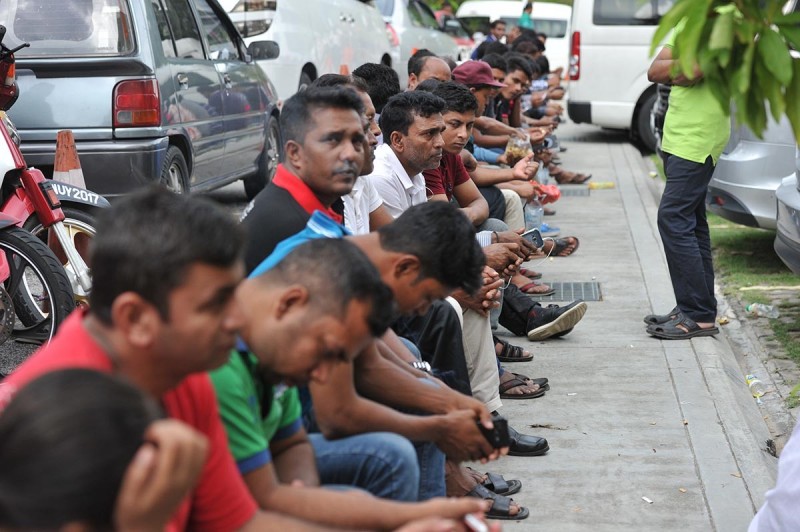
SEVERAL labour practice issues in local firms may not cause a huge dent on the country’s reputation among foreign investors in the near term, but Malaysia stands to lose more if no improvement is made.
Malaysia relies on millions of migrant workers who are often engulfed in underpayment and exploitative work practices.
Concurrently, the labour practices of local and foreign companies operating in Malaysia have been under scrutiny in recent years due to the forced labour among migrant workers.
Recently, British high-tech home appliance maker Dyson Ltd terminated its contract with Malaysia’s manufacturer ATA IMS Bhd over labour practices.
ATA IMS on its part said it has given the government its firm commitment towards further improvement in its environmental, social and governance practices.
Last year, US Customs and Border Protection imposed a ban and Withhold Release Order (WRO) against Top Glove Corp Bhd as it indicated that the world’s largest latex glovemaker utilised forced labour.
The latest Malaysian company in a similar predicament is Supermax Corp Bhd, which resulted in a WRO in October this year on its products exported to the US.
Human Rights Commission of Malaysia commissioner Jerald Joseph said the Dyson-ATA IMS issue may not impact Malaysia as a whole, however, it showed negligent signs in managing labour issues.
“We can see several allegations of forced labour in some sectors such as plantation, manufacturing and glove sector. Also, Malaysia has been downgraded to tier three from the US Trafficking in Persons Report this year,” Joseph told The Malaysian Reserve (TMR).
According to Joseph, Malaysia is still lacking in many aspects of the International Labour Organisation (ILO) indicators such as retention of identity documents, excessive overtime and abusive working and living conditions.
The 2021 Trafficking in Persons Report downgraded Malaysia as the country was deemed as not fully meeting the minimum standards for the elimination of trafficking and was not making significant efforts to do so.
“I think foreign investors do not just simply want to sign the contract, take profit and move out. I believe they want to ensure that the company they are investing in will stand out as the best company and is pushed towards having the best worker recruitment,” Joseph said.
He noted that Malaysian companies may not afford to give the best for migrant workers as they lack funding to do so.
“I think this is what I called a temporary ‘glitch’ economy that forces us to upgrade our compliance for the migrant workers. Malaysia needs to check the policy and improve the benchmark in order to attract more investment to the country.”
Malaysian-German Chamber of Commerce and Industry (MGCC) CEO Daniel Bernbeck said the Dyson-ATA IMS issue received only a little attention outside Malaysia and may not affect foreign investors’ sentiment in general.
“This case probably would not have that much effect in terms of deterring foreign investments,” Bernbeck said in an email reply to TMR.
“What it could potentially mean is that now foreign investors and the business community are aware of the considerable level of attention to human rights topics in Malaysia.
“This, on one hand, could make them become more diligent to avoid reputational damage so that their company name does not appear in such headlines. On the other (hand), it shows that Malaysia is aligned with the rest of the world on this matter.”
Meanwhile, Bernbeck believes that Malaysia is committed to combating human rights and labour issues with its Sustainable Development Goals (SDGs) plan.
“Malaysia has adopted the United Nations’ SDGs and has established a National SDG Roadmap a few years back. By holding the Malaysia SDG Summit in 2019 and incorporating the SDGs in the 12th Malaysia Plan, we believe there is no reason to doubt that Malaysia is showing its commitment to human rights and labour issues.”
However, he emphasised that human rights labour issues are a serious topic in the workforce, as well as for the country’s image.
“If companies do not get it resolved, it has the potential to be very damaging to the company, but also to Malaysia’s image and viability as a preferred business destination.”
According to Bernbeck, from 2023 onwards, Germany has passed a law that obliges large companies to take responsibility for human rights throughout their supply chains all around the world.
“We hope that with the adoption of the UN SDGs worldwide, which does have a heavy emphasis on human rights, nations all around the world will work together to ensure that the welfare of every worker is being taken care of properly.”
Moreover, he said the business community should act on their own understanding of what is the right thing to do rather than being forced to by law.
“Being German, I generally believe that the business community should always periodically review and find ways to improve their standard operating procedures.
“So, our vote would be to trust the self-regulating powers of the business community and encourage them to lead by example, instead of waiting on enforcement by the authorities.”
In the meantime, MGCC is currently preparing a series of sessions to raise awareness inside the business community about these issues.
“We will point out the potential reputational and economic risks they can pose onto our member companies, if not taken seriously,” Bernbeck said.
Source: https://themalaysianreserve.com/2021/12/15/labour-practices-in-local-firms-need-improvement/

